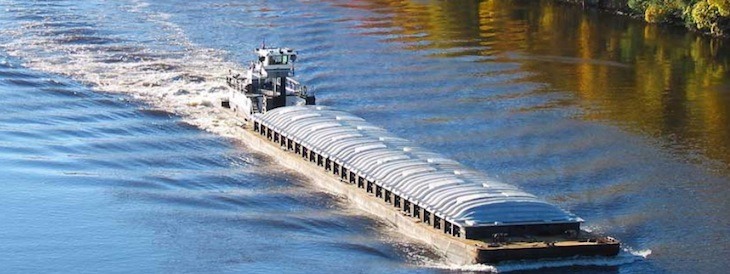Floods, tariffs, pandemic hit Arkansas River traffic
by April 15, 2020 4:48 pm 1,167 views

Between historic floods, a lengthy tariff war and now a global pandemic, Marty Shell is not surprised Arkansas River traffic is down more than 10% in the first quarter of 2020. He’s also not sure the downward trend will soon reverse itself.
During the first three months of 2020, river commerce totaled 2.489 million tons, down 10.4% from the 2.779 million tons in the first three months of 2019, according to the U.S. Corps of Engineers. The biggest gain in traffic was with internal shipments, or cargo shipped between ports on the river. That segment recorded 714,821 tons, up 54% from the 465,573 tons in the first three months of 2019. Outbound traffic was down 18% and inbound traffic was down 27.5%.
Following are the top five shipment categories by tonnage for the first three months of 2020, with the percentage change from the same period in 2019.
• Sand, gravel, rock: 777,332 tons (up 49%)
• Chemical, fertilizer: 524,995 tons (down 28%)
• Soybeans: 259,900 tons (down 28%)
• Wheat: 254,873 tons (up 0.5%)
• Iron & steel: 241,400 tons (down 55%)
The historic flooding hit the Arkansas River (McClellan-Kerr Arkansas River Navigation System, or MKARNS) in May-June of 2019 after rains of up to 600% above normal in northeast Oklahoma and southeast Kansas overtook the capacity of Oklahoma reservoirs to store the water. Gov. Asa Hutchinson said in late May that flooding along the river had stopped commercial barge traffic on the Arkansas River at a cost of $23 million a day to the state’s GDP. River tonnage in 2019 totaled 8.48 million tons, down 22% from 2018.
The Arkansas River system is 445 miles long and stretches from the confluence of the Mississippi River to the Port of Catoosa near Tulsa, Okla. The controlled waterway has 18 locks and dams, with 13 in Arkansas and five in Oklahoma. The river also has five ports: Pine Bluff, Little Rock, Fort Smith, Muskogee, Okla., and the Tulsa Port of Catoosa in Oklahoma.
Shell, president of Van Buren-based Five Rivers Distribution, the past 10 months have hit river operators with floods, tariffs and now a global pandemic.
“Tariffs are still killing the steel market and end users are passing those costs on. It’s also affecting the grain and feed side as well. Tariffs need to be lifted soon to help with the recession recovery that we will be facing very soon,” Shell said.
Much of the iron and steel shipments, which are down 55% on the river, are used in the state’s manufacturing sector, Shell has said. He also said the uncertainty surrounding COVID-19 is also filtering through the businesses that depend on products shipped by barge.
“Coronavirus is starting to show as well along with a few high water flow events the past 60 days. We are seeing the end users either shutting down due to coronavirus directly or that the supply side is flooded and now they have to start laying people off. With no clear picture of a cure or a vaccine, and the uncertainty of the economy bouncing back quickly I’m afraid we will be in a recession climate for all this year if not next year as well.”
